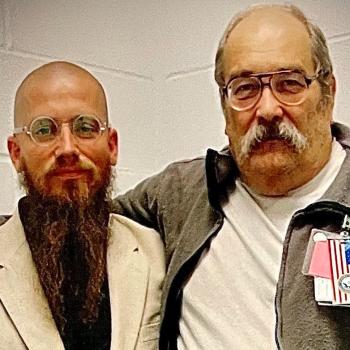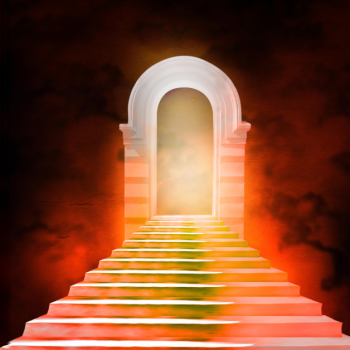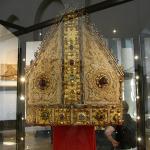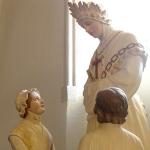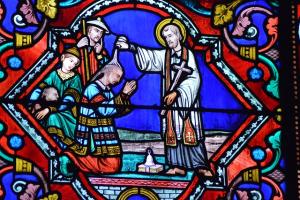 When I became Catholic in 1996, it was Testimony Time in the Church in the United States. Conversion stories were everywhere—audio and video presentations, magazine articles, books. There was even a television show on a Catholic television network dedicated to interviewing prominent converts. As a convert myself, I read and listened to as many conversion stories as I could find, eager to find out what brought other people into the Catholic Church.
When I became Catholic in 1996, it was Testimony Time in the Church in the United States. Conversion stories were everywhere—audio and video presentations, magazine articles, books. There was even a television show on a Catholic television network dedicated to interviewing prominent converts. As a convert myself, I read and listened to as many conversion stories as I could find, eager to find out what brought other people into the Catholic Church.
One thing started to puzzle me though. By far the largest demographic pouring into the Church in the U.S. seemed to be white, male, middle-aged, conservative Evangelical Christians. (They were the ones who were getting the spotlight anyway. ) These were men who’d spent time in Protestant seminaries, often in the pulpit of Evangelical churches, more than a few of them active in the pro-life movement. Running a close second in numbers were the conservative Anglicans, many of whom had been priests. What was it that was drawing in so many conservative Christian men?
If I had to isolate a single common factor in the conversions I encountered, it would be that these men were spiritual wanderers, dissatisfied with the churches they’d been part of and searching for authoritarianism.
These converts weren’t looking for authority, mind you, although many of them cited a desire for authority as one of their motivations. What they wanted wasn’t a teacher (an authority) but a dictator (an authoritarian), someone who had the power to draw a line in the sand and hell could have anyone who dared set a toe beyond the boundary line.
Considering that many of these converts are still very active in the conservative Catholic bubble, I have no desire to start up any flame wars and won’t name names. But there are a few conversions that stand out for me.
There was the minister and pro-life activist who came to the conclusion that God hates divorce and therefore the divorcees in his congregation shouldn’t be given communion. He recounted walking out of his own church service, at which he was the presider, saying he wasn’t prepared to offer communion to the congregation. Naturally, that led to a separation from that church. Eventually, he became Catholic when he found out that the Catholic Church both acknowledges divorce to be grave matter and restricts those in mortal sin from receiving the Eucharist.
Then there was the seminarian, also a pro-life activist, who recounted how distressed he was when the various mainline denominations he and his wife tried out all proved to be liberalizing their positions on abortion. According to him, he couldn’t find a single Protestant church in his denomination that “held the line” on abortion. He and his wife decided to become Catholic, then found out they had to wait for his wife to get an annulment from her first marriage. Rather than scandalizing them, they were happy that the Catholic Church “held the line” for marriage.
These two were proteges of the grand poobah of ’90s Evangelical converts. The grand poobah was a minister and college professor who’d claimed to be a huge anti-Catholic who’d found that the Church of the Bible was actually the Catholic Church. His conversion testimony was recorded and the tape distributed far and wide, inspiring fellow conservative, white, Evangelical ministers to follow him into Catholicism.
Naturally, once these former Evangelicals converted, they weren’t content to sit quietly in the pews and listen intently to the priests and deacons preaching the gospel. Hadn’t these men spent years learning Christianity at the university level? Hadn’t they trained for careers in ministry? Such a waste to leave them languishing on the vine when they could be teaching all those poor, benighted cradle Catholics, whose education in the faith they assumed had ended at confirmation, what it really meant to be Christians!
Never mind that their training in Christianity had been under the auspices of teachers whose authority they’d scorned and rebelled against. If it ever crossed anyone’s mind that they might need to unlearn their assumptions about Christianity, to be formed extensively in the Catholic tradition (say, for the eighteen or so years the cradle Catholics had spent growing up in Catholic families) before presuming to teach anyone Catholicism, I never saw evidence of that.
It’s been over thirty years since the first explosion of Protestant conversions to Catholicism in the United States. Where are we now? Well, those early converts did manage to muscle their way into parishes, dioceses, and Catholic colleges and universities. Some barely allowed the confirmation chrism to dry on their foreheads before they were petitioning for admission to the diaconate and priesthood. In the case of conservative Anglican priests who decamped from the Church of England out of revulsion for women priests and bishops, many of them never had to spend time as lay Catholics. They were quickly installed as Catholic priests, especially when they brought large portions of their former congregations with them.
I spent nearly twenty years as a Catholic apologist, so you would think this would warm my heart’s cockles. At first, I was warmed. I enjoyed Testimony Time back in the ’90s. Twenty-five-plus years on from my own conversion though, I’ve looked around the American church. Rather than the Church having formed a generation of converts into Catholics, all I see is the Church in America having been remade in the converts’ own image.
Back in the 1980s, the American Church was pro-life, yes. But it defined being “pro-life” far more broadly than abortion—to include a “seamless garment” of life issues, including nuclear disarmament, gun control, environmentalism, workers’ rights, and racial justice. These were the concerns of American bishops in the ’80s, and many of the clergy followed that lead. These days, the clergy, including many bishops, seem to care only about abortion. If they have any time left over for other concerns, that time goes to figuring out how best to block access to the sacraments to LGBT Catholics and to divorced and remarried Catholics.
Where might the shift have taken place? This is a blog post, not an academic study, so I can’t provide you with expert analysis. All I can give you is the observation of someone who entered the Church in the mid-1990s, worked for two decades as a staff apologist at an apostolate that specialized in working with converts, and now looks back on that history with a jaded, burnt-out eye.
The converts managed to work their way into the levers of power in the American church. They positioned themselves in places of power—both “in person” in parishes and dioceses and institutions of higher learning, and virtually, through the new forms of media such as the Internet. Slowly but surely, their influence has been felt. The young priests are often educated in seminaries by converts who were hired as professors in seminaries. The young bishops and many of the priests may have been formed on the media the converts sent gratis to seminaries.
A couple of personal anecdotes: Cirilo Flores, who was Bishop of San Diego for one year—he died of cancer not long after he was installed as bishop—told Catholic Answers’ employees when he visited the office that he’d read the apostolate’s magazine regularly when he was in seminary in the ’90s. And when I was in formation with the secular Carmelites, the spiritual advisor was a new Carmelite priest who took one look at me and exclaimed, “I know you! I used to read your articles for Catholic Answers when I was in seminary!”
Conversion can be a good thing. I may be jaded and burnt out, but I know that many people have found spiritual peace and joy by reforming their spiritual lives. But when the converts don’t actually convert, when they take over the institutions and remake them to suit the converts’ own spiritual agenda… maybe converting the world isn’t all it’s cracked up to be.
(Image: Stained glass window, Pixabay.)






